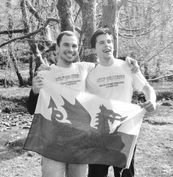The offer from Swansea University was like a dream come true, excitement, mountain high expectations, all that in the ugly, lovely town of Swansea and with the Gower Peninsula on your doorstep with its stunning natural beauty and fabulous coastline. The bare thought of having Fish & Chips at my favourite corner of the whole wide world, Mumbles, warmed my heart like there`s nothing else in life that really matters. There was only one minor problem. I didn`t quite had enough money in my pockets to pay for a full year package of student life. The second floor of Fulton House is the social hub of campus, this is where JC`s can be found. JC`s is not a bar or a café. It’s an interview day, I turn up, pull a number, sit down and wait. They call my number, this will be a disaster, I never did an interview so unprepared. I sit down, smile, Karen, my future mischief instructor (I mean my boss) smiles back at me which makes me smile even more and I know it’s gonna be alright. I got lucky, job sorted, I can tick the box. A few weeks goes by and I start to understand how lucky, lucky can get. Every day is fun, everyone is great, it is a pleasure working here and we become friends so quick. I am all over the place, I volunteer and I fundraise. I haven`t seen the library from inside yet and am already engaged with two charities. Everyone in JC`s is there for me when I need a hand. During a single academic year I raise over one thousand quid, more than half of it with the help of JC`s and its fundraising militia. One year later, here we go again. I am preparing for the single greatest challenge of my life attempting to summit Imja Tse at 20.305 ft. in the name of charity and the team in JC`s is with me again. Their first fundraiser grows out of a quick chat and the mentioning of our project, yes, that`s all the inspiration these guys need. They raise 50 ponds swiftly and move on to the next one straight away. This time with the help of Adam Robinson, Help Us Learn’s very own Director of Public Relations. I talk to Adam about it and I just cannot stop thinking how to thank them. I hope this post will do justice. We all have half an hour to spare or a lost quid in our pocket. We all have friends who can help us or inspire us. We just have to make a simple decision: Today, I will make a difference! And this is why I am so grateful for the whole team of JC`s. You make a difference and I hope that your generosity and kindness will inspire many more to give, to care and to make a difference. Because together, we can make a difference!ALL DONATIONS GO DIRECTLY TOWARDS THE JVF-Nepal 'PRIMARY SCHOOL EXTENSION PROJECT' AND 'SCHOLARSHIP PROGRAMME'
It’s been a while, I know. Fundraising, networking, plenty of training, an intense start to a new job and a quick visit to Kathmandu-later, let me return with a cute little story.
I think it was the day before we flew to Kathmandu, ‘easy like Sunday morning’ feeling except for it was a Saturday. Anyhow, I trotted down to the Nordic Club to have a haircut. It was a very special day for me, especially since my hair hasn`t seen scissors since October and although I prefer my rough edge, the mess on the top floor was just too much. I know what you are thinking but yes, one’s hair can get that messy. So here I am, thinking about my haircut and how I will be late for footy, I get there, check in and take a seat. Just like at the dentist, a haircut always starts with a little waiting game, oh and did I mention I am already late from footy.
You can expect many things at a hairdresser. You will leave with a piece of your left ear missing or your new hair cut might be a disaster but what was coming I couldn`t have guessed in a million years.
Su, my hairdresser - or after watching her for five minutes handling the scissors I should say hair stylist or hairstyle artist - seems to be fun, comforting smile, very relaxed and she’s a real chit-chatter too. She is British, I tell myself with confidence, what else she could be with that charming British accent of hers. I found out later she’s from New Zealand, although she did live in London for a while. We flick through a few magazines to check the best looks for me, shampoo, head massage, a quick chat about the Island Peak Expedition, Jvf-Nepal and Help Us Learn. Then, Su tells me about her travels in Nepal and her sweet experience as a volunteer in a Nepalese orphanage. I’m very impressed. Final chip-chops and I look like a human being again. She has done a fantastic job! But she’s not done with me.
Normally, every haircut ends with the customer paying. She goes for her valet, I’m very suspicious. She hands over a 1000 Nepalese Rupees note and smiles, please have a drink on me when you are in Kathmandu, she tells me, you are doing a great thing for these kids. I cannot take it, I say, I offer to put it in the fundraising box, which she accepts, that’s ok, but if you put that in the box then your haircut is free, she declares. Let’s put that in the project too and I will also match the 1000 Rs. and the 1500 Tk. She smiles again, we agree. I leave the salon with unexpected satisfaction in my heart.
There’s kindness and greatness of all kind. It is all around you, you just have to look and sometimes it will just find you. Sometimes, all you have to do is to simply give up a glass of wine, put $20 aside, share a message with your friends, organise a cake and tea night to raise money or give a free haircut. This is all it takes to make a difference. This is how simple it is. My hope is that you will find that kindness and greatness in yourself too and show me your support so I can succeed reaching the summit of Imja Tse. But most importantly I hope you will show your support so we can make our education project in Nepal a success story. ALL DONATIONS GO DIRECTLY TOWARDS THE JVF-Nepal
'PRIMARY SCHOOL EXTENSION PROJECT' AND 'SCHOLARSHIP PROGRAMME'
With the mental grit of Sir Ranulph and our bold re-definition of a verb to inspire us, we are pleased (and somewhat terrified) to announce our route. 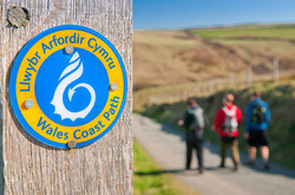 Now this is not set in stone neither do we have major commitments in each area.This intimidating itinerary is the best route we can muster that gives us a good chance of completing the challenge.
We do have the added advantage of amazingly kind friends and family offering resupplies on each weekend of the challenge. So at max we will only have to carry 7 days gear and food at one time. This was, as you can imagine, great news and has given us both a confidence boost and made planning that much easier.
| DAY START
Chester
Towyn
Penmaenmawr
Red Wharf Bay
Cemaes Bay
Penrhos Feilw
Malltraeth
Caernarfon
Nefyn
Rhiw
Llanystumdwy
Harlech
Tywyn
Brynowen
New Quay
Poppit Sands
Fishguard
Whitesands
Marloes
Pembroke Dock
Bosherston
Amroth
Camarthen
Llanelli
Llangennith
Swansea
Ogmore by Sea
Barry
Nash | DAY END
Towyn
Penmaenmawr
Red Wharf Bay
Cemmaes Bay
Penrhos Feilw
Malltraeth
Caernarfon
Nefyn
Rhiw
Llanystumdwy
Harlech
Tywyn
Brynowen
New Quay
Poppit Sands
Fishguard
Whitesands
Marloes
Pembroke Dock
Bosherston
Amroth
Camarthen
Llanelli
Llangennith
Swansea
Ogmore by Sea
Barry
Nash
Chepstow | MILEAGE/TOTAL
30/30
27/57
34/91
25/125
32/157
30/187
30/217
26/243
30/273
31/304
30/334
32/366
30/396
30/426
30/456
30/486
29/515
34/549
30/579
32/612
25/637
31/668
30/698
30/728
30/758
30/788
30/818
30/848
24/862 |
The morning after the night before... 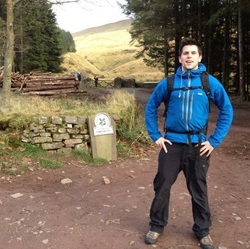 You wake up in a panic. The alarm sounds the beginning of your routine. It's 7.30am and you're picking up exactly where you left off. Thoughts and ideas reforming in your head, those emails that need a response and the time-consuming training that simply cannot be missed, all instantly gripping you, practically predicting your every movement for the next 24 hours. As you sip on your coffee you quickly and begrudgingly realise that once again, there simply will not be enough time to squeeze it all in today.
Every job on that list you made last night becomes less important as the new day brings another job that takes top priority, even though you thought last night's list would be 'the final list'. Your regular porridge brings some comfort as you evaluate your options. "Today I'll train hard, hopefully get those emails sent and head to work, if it's quiet I'll get that blog sorted and price up my gear, if I'm lucky I can get home and work on my core then sleep." When you finally crawl into bed, after completing what you think were the most pressing matters of the day, you're asleep in minutes. Although in those minutes, you're very much aware that today, tomorrow and every day after will always be a little too short.
THE INFINITE TO-DO LIST
Since first thinking up 'The Wales Coast Challenge' back in March 2012, my days have increasingly become consumed by everything that goes a long with a charity challenge. You've got your;
Training:
A time consuming yet vital part of any big challenge. There is no use in publicising a challenge that you physically are not ready for. For us, we train 6 times a week. Training sessions can range anywhere from 1-7 hours long depending on the day. 3 days strength/endurance weight training, HIIT training 4 days a week, Hill walking, endurance walking, aerobic training, cardio-circuits, Pilates, flexibility and balance training, running, swimming and boxing. Typing that was a work out!
Emailing:
Something you wouldn't expect taking up a lot of time but when approaching the press, sponsors, the experts and whoever else will make your life just a little easier, each email must be crafted, must be fine-tuned so that each opportunity is utilised. A template email will get you nothing but misery but a well worked, thoughtful email to a potential partner or supporter can move you great leaps in the right direction.
Promoting:
Everything from creating posters to building your social media presence, driving people to your donation page is THE MOST IMPORTANT PART. You can train and email to your heart’s content but if people don't donate, you've missed the point completely. Not only because you don't raise money, but a donation signifies that your message is getting through. People not only understand why but believe in what you're doing.
Earning:
In a perfect world, this would be my job. But it's not and working to be able to pay for all of this and to live takes time. 40 hours a week to be exact.
Eating:
Some say nutrition is 80% of your training. If you put unleaded in a diesel car... it's gonna blow. It's the same for us. If you put the wrong foods into your body then the mechanisms that allow you to progress won't function well, if at all. Finding the right stuff to eat would be easy as pie if you had all the money in the world, but since earning take up our time then it's clear to see we don't have that money. So you have to be smart, and being smart takes time.
Planning:
I don't think many people have tried to walk 860 miles in 30 days. Neither does the knowledge on how to come naturally or is it easily found on the net. What to eat? What to take or more importantly, what to leave? How heavy is it all? How much does it cost? If I can't afford that then how do I get the best weight to price ratio? How long is all this going to take? Where do I stay? Will camping be of detriment to my overnight recovery? Will hotels be too expensive or not in the spirit of the challenge? Questions that do not answer themselves... let me tell you.
Sleeping:
A training athlete needs 8-10 hours of sleep to recover properly. A normal human being needs 6-8 hours of sleep to allow their bodies to repair and re-cooperate ready for the next day. When 8-10 hours of sleeping leaves you with 14 - 16 hours to Train, Email, Promote, Earn, Eat and Plan... then things start to get a little frantic.
Is that all you're going to do? Comes the question. Yup, I'm aware that it sounds like all this blog wants to do is complain. I assure you this is not the case. I want to show you what goes on behind the scenes of those big fundraisers that come into your life as quickly as they leave it. They are a flash in the pan and it is the end result that we see and brings in the donations. Which I feel is a pity if people knew what went into getting the fundraiser to the start line.
At the moment, making this challenge a success does feel like a never ending circle of things to do, with never enough time to do what we want and always wishing we could do more. There are times when I doubt the ideas we have, we argue amongst ourselves and I even question why we even started in the first place.
Then I open my laptop and read an article on the BBC website. The title reads:
‘Census 2011: South Wales valleys rank bottom for health’
I take another sip of my coffee. A strange relief washes over me. That's right. After reading this headline, I was not shocked or surprised, nor instantly moved or concerned. I was simply, relieved. Relieved because there is a reason why we do this. Why we spend all of our time trying to make this challenge a success. Any way we can. Whether it be though a financial partnership, linking up with schools or completing a challenge that hasn't been done before (that is all 860 miles in 30 days, the Wales Coast Path has been completed by 8 people in various time frames).
All of what we do, everything we work towards, is to give children the opportunities and the chances to prosper in their lives. It could be through re-connecting with nature. It could be through learning to fundraise. It could even be by simply knowing that there are children around the world less fortunate than themselves. Everything we've done will have been worth it.
This is Help Us Learn saying, we're doing everything we can to raise money and awareness for issues that affect children worldwide. We hope you take the time to check that out... and put a cheeky donation down too!We'd also like to put a request in for some more hours in the day. That would be great. ALL DONATIONS GO DIRECTLY TOWARDS THE JVF-Nepal 'PRIMARY SCHOOL EXTENSION PROJECT'.
The saddle of the exercise bike and my royal back side became acquainted just over a month ago. I cannot say it was a bumpy ride or in fact a ride anywhere far as it is difficult to explore the country roads when your bike has no wheels and only moves inches when you hit a high tempo. Nonetheless, it became a daily routine and there’s nothing I would enjoy doing more. On the other hand, to be quite frank, it is not like Dhaka has too many sport activities to offer either, unless you want to count the fierce darts clashes that I reserved my Tuesday nights for. Although, I do not wish to underestimate the importance of the concentration that is so essential in this noble pub game, but that alone will not take me up on any mountain. 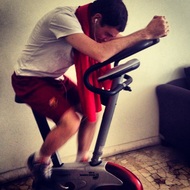 Riding is great for strength and stamina. After a month being an ‘easy rider’ I upped the tempo and now write circles with my ankles for an hour flat, doing just under 40 kilometres. To give you a perspective on this, it is roughly 900 calories burnt which is no less than three pints of Guinness in a lovely Welsh pub, a much loved exercise that you cannot enjoy in semi-alcohol-free Dhaka. After a gentle first 10 minutes, I settle on a 40 km/h tempo, keeping a watchful eye on the display making sure I do not wander off too deep in my thoughts. Continuity is just as important as overall strength and stamina. There is another component of my training: Balance and flexibility.
Tai Chi could be an excellent trek preparation exercise as it focuses not only on strengthening the legs’ quads muscles but also on well-balanced weightless stepping techniques. It was recommended to me and I recommend it to you, but if you want to design a perfect training plan in Dhaka do not have high hopes. Somehow, leisure and recreation is not a big thing in Bangladesh but how could it be a priority in a country with 60 million people living right under the poverty line and the rest working 12-14 hours a day. 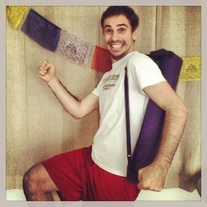 In my search for good replacement I found hatha yoga. I left the first session with the bitter impression that yoga and I will not be best friends. I simply had no idea how inflexible I was. Pyramid and then snake position. So far so good. And then more twisting and stretching of the unstretchable parts. Don’t forget to inhale and exhale. Everything happens in slow motion and half way through I just want the pain to go away. Pain is a great way of training the mind but it is tormenting my body. The instructor shakes his head in disbelief, I cannot be that bad, I look up again, try to shadow the flow of his moves and am certain in time I will get there…a long long time though but I will get there.
My partner does everything with ease and an annoying smile on her face. She is 14 years of jazz and classic ballet ahead of me in terms of flexibility but her enthusiasm for our newly found hobby will be my motivation. So hatha yoga, here I come again.
* I am off to yoga with my lovely purple yoga mat..
 “I hope nurses and doctors will come soon,” Nar Bahadur Sunar says with a wistful smile, “Then no one will have to go through the nightmare my wife and I had to.” His hopes are high after the Community Health Center in the village formally kicked off with the basic health services from October.
Six years back, Nar Bahadur’s 41 year-old wife Bhim Kumari had a miscarriage which nearly took her life. It was her fourth miscarriage. This miscarriage left her critically ill for more than a year. The frequent miscarriage Bhim Kumari suffered was due to the lack of care and regular check-ups. Such luxuries, in terms of the safety of mother and unborn child during pregnancy, were out of question as there were no hospitals nearby.
She was four months pregnant when she lost her child, again. She was suffering from heavy blood loss and an unimaginable pain that left her unconscious for days. Nar Bahadur carried her on his back for two days to reach the hospital in district headquarter Khalanga for treatment. "On the way I would anxiously wait for her to groan," he says, "heart breaking as it was to hear but it conformed she was alive."
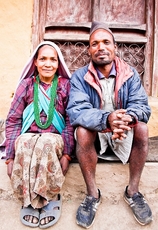 When they reached the district hospital at Khalanga, Bhim Kumari was almost non-responsive. The medicine needed for her treatment was not available at the hospital so they had to wait for one more day to get the medicine from Kathmandu on a helicopter. After few days she was referred to Mahendra hospital in Dang. Five more days of walk took them to the hospital and she stayed there for a month to recover.
Now, a healthy woman, Bhim Kumari is using contraceptives and is mother of 3 children. Nar Bahadur says he is still unable to pay back the loan he took for hospital charges. "Seems like this loan will extend to our children," he says with a frown across his forehead. But in a second his frown changes into a broad smile as he looks at his wife and pronounces, "But, she is alive!"
Not everyone is lucky. The lack of health center or a hospital nearby has left many lives bereft and grief-stricken in the village. Almost every delivery takes place at home, alone, without skilled birth attendants, risking the lives of both mother and newborn child. Poverty, lack of awareness, early marriage and early motherhood leads to the complications. Preventive reproductive health issues become a challenge while many lives are lost due to lack of proper care and timely diagnosis. 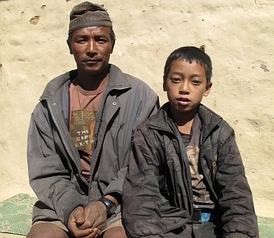 The pain of losing a wife and an infant of Til Bahadur hit Kamara Shrestha in 2009 when his wife died because of childbirth complications. She already had suffered from two complicated deliveries and newly born children had died soon after birth. "Compared to other women Dhokashari had weak health and each child birth left her weaker and sicker," Kamara says.
So, when Dhokashari, 28, got pregnant again Kamara wanted to go for a check-up. But, they were building a house and days were comparatively busier. "She didn't want to go for check-ups," he says, "She used to say that the hospital was too far."
During delivery, traditional midwives were called but they were not able to help. The infant had died in the womb and there was excessive bleeding. After struggling for two long days Dhokashari was barely conscious. With her health further deteriorating, in the middle of the night, Kamara carried her in a basket to take her to district hospital Salle. She breathed her last breath at Chhing; a place far from home, a place far from the
hospital.
"Every day I pray that even my enemy should not have to go through such pain," Kamara says. And, with a health post in a village, he is happy his prayer is in a process of being answered. "I am very happy. Now, our women will be able to go for regular check-ups and get long-needed help in time," he adds with a
smile.
Kamara's hopes and smile touches Til Bahadur's who believes the new generation will not have to suffer the way they had to with the hospital in the village. "Now, we are just in need for good doctors and nurses," he smiles, "I hope they will come soon."
The Island Peak Climbing is a Grade 6 - Strenuous Plus - trekking expedition. This grade includes climbing peaks, oh yes, peaks very much in plural, as climbing over 20,000 feet is a bit like flying, first you try your wings, see if they work and only then you jump from the edge of a cliff. And of course it also involves some highly demanding treks in remote areas. Basic knowledge of how to use crampons and ice axes are appreciated, says the brochure. It would be a slight exaggeration to state that any of those are ever needed or have even been seen in the Zemplen.
I did tell you about the Expedition, our goal, our motivation and the hard working people of Jhumlawang who inspired us to step up our game. I shared the story of our Kathmandu visit with you and introduced our partners. I feel I still owe you a different kind of story. Given that everything I do revolves around the Island Peak Expedition itself and since I wouldn’t take my chances on survival without appropriate preparation, I will push myself through a somewhat strict training regime and I thought it would be fun to report on that matter too.
Though physical fitness is an important part of any outdoor activity, you do not need to be an athlete to enjoy trekking in the Himalayas, says the leaflet, however, the fitter you are, the more you will enjoy it. It all sounds very romantic but then I remember reading about ‘silly’ accidents on the way to Base Camp, experienced Sherpas falling of the rope due to tiredness or even ridiculously trivial things like a stomach bug or a tormenting cough turning experienced climbers around before reaching the foot of the hill only to try next time. It is not a walk in the park after all and I have no intention to tempt the devil.
There are three basic components of my preparation: aerobic and flexibility; strength and stamina: and of course mental readiness. Aerobic conditioning is important primarily because trekking in thinner air - up to 40% less than at sea level - I will need to be able to better metabolize whatever oxygen is available. Walking, jogging, cycling, hiking on valley floor to ridge line ascents with daypack are some of the excellent forms of exercise, as long as you are strengthening leg muscles and building stamina. I must confess I am somewhat limited in Dhaka in terms of hiking opportunities but I have everything I need for the other exercises, two good legs and a pair of newly purchased running shoes. Although, how good those two good legs are, similarly to the hiking in Dhaka part, could be debated too. 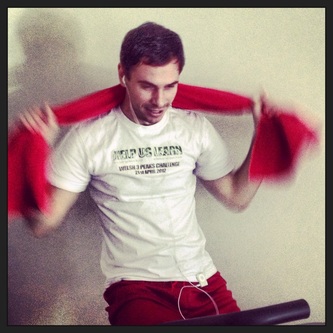 After a few not-too-challenging ‘warm-up’ rounds in December, I started my training on 2nd January. I hop in my running shoes six days a week, some days twice, rest only one day. I swapped my daily rickshaw rides around Gulshan-2 to walking, food shopping strictly on foot, jogging in the local park anytime between an hour after sunrise and an hour before sunset to avoid the life threatening mosquito invasion.
Most of the time I hit the imaginary roads in front of my exercise bike in the living room. Although, I do a fair distance every time, the most challenging part is to keep the wheels rolling whilst the bike does not move an inch. A 150 km mountain stage in Cote d’Azur is less trying mentally than 20 km on the exercise bike. But then, mental preparation is just as important, so I close my eyes, stay with the pain and imagine climbing up on the serpentine roads of Tourette Sur Loup.
The journey to the top starts way before you could even measure the summit with your own eyes, it is hard work and will be challenging both mentally and physically but walking on this path with one eye on the prospect of completing the Primary School Extension Project of Jhumlawang makes it a worthy quest. So, on ya bike mate! ALL DONATIONS GO DIRECTLY TOWARDS THE JVF-Nepal 'PRIMARY SCHOOL EXTENSION PROJECT'
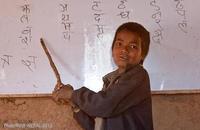 Due to a shortage of teachers one day at the Jhumlawang Primary School, this little guy stepped up and volunteered to teach a classroom of his younger peers. JVF-Nepal is the community based foundation working to improve the conditions of this school and all other aspects of key sustainable infrastructure that the village of Jhumlawang needs to be self-sufficient. One of its members describes the story whilst on a visit to the village:
"One day during my visit last year in December, I was just passing by our primary school. I heard a bit of an unusual voice in a class, and other kids were repeating what he was saying! So, I walked towards that class and there he was. A little boy acting as a teacher and teaching his Juniors! The confidence I saw on him at that very moment re-affirmed my belief that our community certainly has a better future!!"
Buddha Kush - JVF-Nepal International Coordinator Now at the time, this simple act may have been only looked upon as an act of great kindness. However, if you look at the situation of the village you'll begin to understand that this act exemplifies the attitude and spirit of the people of Jhumlawang. The village, and surrounding villages, are in desperate need of electricity, not only as it is an obvious necessity of modernity but it will speed up progress of other building projects including the extension of the Jhumlawang Primary School. The school that is producing confident and intelligent children such as the child mentioned above. 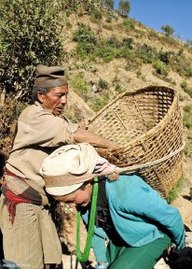 They have been lucky to some extent in the sense that the Alternative Energy Department of Nepal have initiated the Kyangsi Khola River Micro-Hydro project that will provide electricity to Jhumlawang and its neighbouring village of Kyangsi. This project isn't a gift. To make it work, both communities must contribute at least 40% of the total budget allowed. In this case, €96,000 worth of physical labour must be put forward. This is done through a contractual and moral obligation that one member of every family must work on the 'Micro-Hydro' project. This is the case with all progression in Jhumlawang. All projects, from the Primary School to the Community Health Centre, are subsidized as much as they can be by human resources that are locally available. The villagers show that they are doing everything they can do make their village a more sustainable place to live. Their attitude very much reflects a famous quote: 'God helps those who help themselves.'In doing all of this, their aims are to try and inspire neighbouring villages to follow this way of life-philosophy. Although, as a result of their hard work and commitment to a better, more sustainable future, human resources are spread too thin over their current projects. The Primary School Extension, that the 'Help Us Learn: Wales Coast Challenge' is raising funds for has had to be delayed to allow more time and resources to be spent on the 'Micro-Hydro' project, that itself needs to be finished before monsoon season, June 2013. As you can see, our work is more important now than it's ever been. The phrase 'our work' doesn't just mean Help Us Learn and JVF-Nepal, it's all of us working together and gaining understanding for a better future, just like the people of Jhumlawang. We're taking on this challenge in the hope that you can be aware of these issues and others like it around the world. The funds we raise will go to making all their work worthwhile. You can find out about the great work being done by JVF-Nepal and the people of Jhumlawang to create a sustainable way of life on: www.jvf-nepal.org
ALL DONATIONS GO DIRECTLY TOWARDS THE JVF-Nepal 'PRIMARY SCHOOL EXTENSION PROJECT'
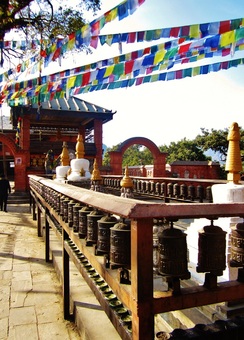 It’s around lunch time. I check the time on the clock above the terminal’s gate, it’s 15 minutes late. I ignore it, am queuing up for passport control. My eyes cannot help scanning the lobby, another clock on the red brick wall, 15 minutes late again. It is a strange universe in a strange time zone. Everything on the clock will happen here 15 minutes later. I only find out what’s behind the time zone mystery two days later, by that point I don’t care. Kathmandu is a fascinating place. Just like time, it will get there but there is no need to rush anything. This is our first visit to Kathmandu.
Everything is made of brick. How do I know? If it is brick inside it is brick outside. This is no place for luxuries like a slim coat of wall paint, a lumpy layer of slap-dash, insolation or whatsoever. There are the brick walls. What I do not know about yet is dust. Not the Philip Pullman kind of dust that flows between parallel universes exciting the scholars of Jordan College in Lyra’s Oxford. This is a different kind. It is the regular kind. And it is just everywhere. We hit town and buy a couple of pashmina scarves from one of the million little bazars of Thamel, cover our face up to the tip of our nose and we inhale sand-less air again.
I am buzzing with excitement, I do not know what lies ahead but I have a good feeling about this journey. Namaste! Our friends welcome us with ‘katas’ and a necklace of flowers as soon as we leave the red walls of the airport behind, Purna dai, dai referring to an ‘older brother’ as well as the appropriate way of addressing a friend or a family member senior to you, and Amrit, Purna dai’s‘brother-in-law’, although Amrit is not married to Purna dai’s daughter, complicated, mannerisms and the customary inheritances of an ancient civilisation, we will learn it.
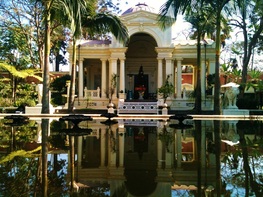 Kathmandu is a fascinating place with endless charm, kindness and charisma. Looking down from Swayambunath, the city looks dull with its carpet of houses and not an inch of difference in its landscape, an image from above that could not be further from what Kathmandu really is. Walking the labyrinth of small streets, getting lost in the bazars and boutiques of Thamel or Lazimpat, connecting with the world via wifi - which is free in every hidden café and bar – or forgetting about time and space behind the walls of the Garden of Dreams with the help of a good cup of Nepalese tea with its ever changing aromas of cinnamon and cloves… Kathmandu is a hero with a thousand faces upon which Campbell’s theory of monomyth perfectly applies:
“A hero ventures forth from the world of common day into a region of supernatural wonder: fabulous forces are there encountered and a decisive victory is won”.
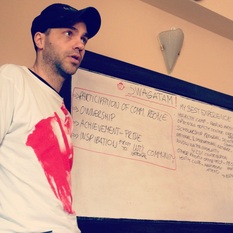 We are here to learn more about this hero and the supernatural wonders, we are here to meet our friends from Jhumlawang and we are here for a training. Zsolt, a world class trainer from Singapore, accepted our invitation to coach up a small group of ‘dedicated activists’ of our partner organisation, Jvf-Nepal. He has never run trainings for NGOs. Political and business leaders running countries or the world economy are home pitch for him, that’s easy, that’s routine. Rumour has it Zsolt is in town and we need no more, the number jumps from six, first to eight then twelve then fifteen.
Talim ma swagatsa - welcome on the training - eighteen people’s smile shines through the small room. Some from Kathmandu, some just arrived from Jhumlawang, the village that is an easy four hours hike, six hours jeep ride and twenty-six hours bus ride away from the capital’s bus station and from there it is only twenty minutes by a tiny Maruti taxi. We pin our origins on the map of Nepal, some of us are off the map and some of us just too confused what the question regarding our origins really refers to. The hills of Zemplen, grey London, ‘time of my life’ Paris, always sunny Wales or Dhaka? We warm up with a game, Zsolt is eager to map the group, find out more about Jvf and figure out the right approach to one of the biggest challenges he ever faced. English is a barrier but we use the complementary language of games and movements to communicate and the genuine enthusiasm of our friends lift the quality of the already-high-spirited workshop. We have mo-mo for lunch, don’t ask, it is yummy. We crack on with a new exercise and then come the highlight of the six hours training session, we ‘walk-about’. The blind-folded leadership exercise proves to be popular. Safety and fun! Zsolt gives the marching order to the troops. And our leaders aim for the two objectives whilst leading their sightless ‘workers’ around. We learn about ‘atmiyata’ - empathy in Nepalese -and trust and knowledge and the myriad dimensions of what it takes to be a good leader. We conclude our workshop with a panel discussion exercise to enhance decision-making skills.
It does not happen often that tears run down on your cheeks simply because you realise life can be very meaningful indeed. I am there, am proud, am grateful and am profoundly touched. Our new friends make me feel that all the work we put behind our projects are worthy of such investment. They want to make things happen. They want to make life in the village better. They know that education is the key to their success and are ready to build a primary school. They are ready to learn and work hard for what they want. And I cannot stop thinking just how lucky I am to be given this huge opportunity to be part of their lives.
I wish I wouldn’t have to leave so soon but I find comfort when I remember, in fact, I will be back sometimes, sometimes very soon.
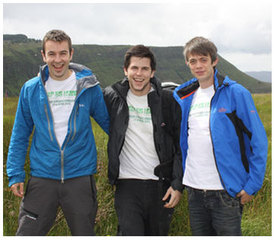 This April, we'll be attempting to walk the 860 mile Wales Coast Path in under 30 days. This huge expedition is part of a fundraising effort to support sustainable educational projects in Nepal, Peru and our local community and beyond. Help Us Learn aims to raise the money our partner's projects need to continue their work. We then plan on continuing our work with schools through giving talks and running workshops that are designed to teach children about global education issues, fundraising and the importance of getting active and outdoors. In Nepal we have partnered up with JVF-Nepal. They are a community based non governmental foundation that runs projects that cover a range of fields including education, health care and sustainable agricultural development. With sustainability at the core of everything they do, Help Us Learn share these beliefs and goals that aim to create sustainable education systems. We are trying to raise an initial £7,500 to help extend their primary school which will improve the quality of the education they receive but also allow them to receive further schooling. One of the major problems is that they are not able to receive levels 6, 7 and 8 of schooling and at the moment are forced to choose between a treacherous 2 hour trip in monsoon season to get this education or STOP their education all together. In Peru, Academia Latinoamericana de Espanol is a well established Spanish language academy based in South America with facilities in Bolivia, Ecuador and Peru. The organisation runs volunteer programs which include work in areas such as kindergarten, youth rehabilitation centres, babies and young children, nursery and primary school, medicine, disabled children and adults, children’s homes, wildlife park and community outreach. The projects and programs have seen the lives of many children and adults alike changed for the better by providing a safer place in which to live and study. In our local community, we want to teach children about the projects we work to fund and the wider issues that affect children in similar positions around the world. Teaching children at an earlier age gives them a chance to experience these issues and we hope that as they grow older and have the capacity to fully understand them, they will be more inclined to act on the knowledge they have. We want to raise money to fund our school projects and allow ourselves the chance to give talks and run workshops designed to teach children about global issues, fundraising and the importance of being active. A big part of the talk is trying to get them thinking about unique, interesting ways to fundraise. Hopefully their ideas take them outdoors and beyond, this is important for several reasons. Fundraising teaches vital leadership, organisational qualities and ignites creative skills whilst getting them outdoors combats child inactivity. As mentioned, child inactivity is something we have been concerned with since the beginning and with a plethora of new research being published recently it's time to really start finding ways to combat it. What we aim to achieve is simple. Raise enough money to support sustainable education systems abroad and tell children in the UK about our efforts. We want children to be aware of these issues and inspire them to think of creative ways to help fund more educational projects around the world. Children can be the most creative people in the world because they are not afraid to be wrong. By working to fund our partners projects and inspiring children to carry out similar work hopefully we'll inspire a new generation of 'sustainable fundraisers'. People who are aware of the issues, aware of how to fundraise and when the opportunity comes in their lives to contribute to the global effort, these people will embrace it. As opposed to never knowing the opportunity was there for them to utilize. We're inviting you to follow our blog and learn about the projects, organisations and the people trying to solve some of the above problems. Wishing you good times during the festive season, The Help Us Learn TeamYou can learn more about the Wales Coast Challenge on: http://walescoastchallenge.weebly.com/
|










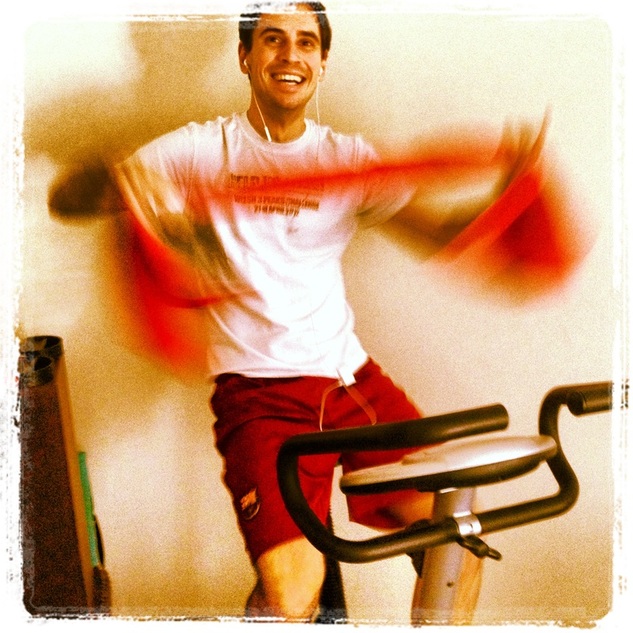








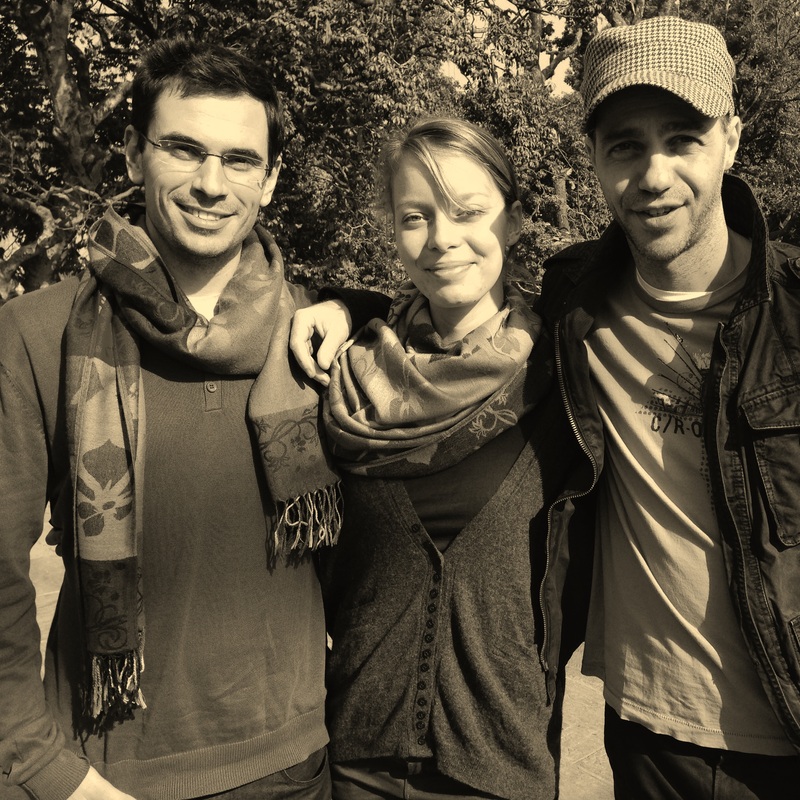

 RSS Feed
RSS Feed